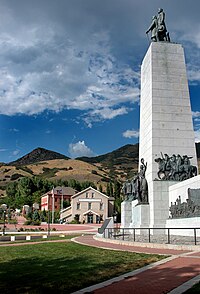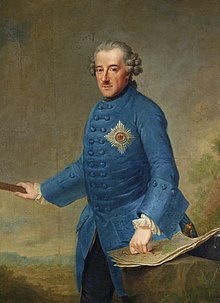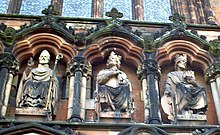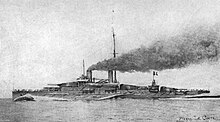Portal:History
The History Portal
History (derived from Ancient Greek ἱστορία (historía) 'inquiry; knowledge acquired by investigation') is the systematic study and documentation of the human past. History is an academic discipline which uses a narrative to describe, examine, question, and analyze past events, and investigate their patterns of cause and effect. Historians debate which narrative best explains an event, as well as the significance of different causes and effects. Historians debate the nature of history as an end in itself, and its usefulness in giving perspective on the problems of the present.
The period of events before the invention of writing systems is considered prehistory. "History" is an umbrella term comprising past events as well as the memory, discovery, collection, organization, presentation, and interpretation of these events. Historians seek knowledge of the past using historical sources such as written documents, oral accounts or traditional oral histories, art and material artifacts, and ecological markers.
Stories common to a particular culture, but not supported by external sources (such as the tales surrounding King Arthur), are usually classified as cultural heritage or legends. History differs from myth in that it is supported by verifiable evidence. However, ancient cultural influences have helped create variant interpretations of the nature of history, which have evolved over the centuries and continue to change today. The modern study of history is wide-ranging, and includes the study of specific regions and certain topical or thematic elements of historical investigation. History is taught as a part of primary and secondary education, and the academic study of history is a major discipline in universities.
Herodotus, a 5th-century BCE Greek historian, is often considered the "father of history", as one of the first historians in the Western tradition, though he has been criticized as the "father of lies". Along with his contemporary Thucydides, he helped form the foundations for the modern study of past events and societies. Their works continue to be read today, and the gap between the culture-focused Herodotus and the military-focused Thucydides remains a point of contention or approach in modern historical writing. In East Asia a state chronicle, the Spring and Autumn Annals, was reputed to date from as early as 722 BCE, though only 2nd-century BCE texts have survived. The title "father of history" has also been attributed, in their respective societies, to Sima Qian, Ibn Khaldun, and Kenneth Dike. (Full article...)
Featured picture
Did you know (auto generated)

- ... that in 88 BC, Lucius Cornelius Sulla carried out the first coup d'état in Roman history?
- ... that Charles Turzak's book of woodblock prints presenting the life of Abraham Lincoln was the first ever such life of a historic figure presented only in images?
- ... that historically, lichens like Umbilicaria torrefacta have been used to naturally dye traditional Scottish tartans and textiles?
- ... that the Harlem Park Three were awarded US$48 million, the largest sum in Baltimore history, after being falsely imprisoned for murder?
- ... that the Chinese government began compiling an official history of the Qing dynasty in 2002, but as of 2023 a protracted political review is forestalling its publication?
- ... that the first game in Georgetown football history was never played?
Lisa del Giocondo (Italian pronunciation: [ˈliːza del dʒoˈkondo]; née Gherardini [ɡerarˈdiːni]; June 15, 1479 – July 14, 1542) was an Italian noblewoman and member of the Gherardini family of Florence and Tuscany. Her name was given to the Mona Lisa, her portrait commissioned by her husband and painted by Leonardo da Vinci in the Italian Renaissance.
Little is known about Lisa's life. Lisa was born in Florence. She married in her teens to a cloth and silk merchant who later became a local official; she was a mother to six children and led what is thought to have been a comfortable and ordinary life. Lisa outlived her husband, who was considerably her senior. (Full article...)
On this day
November 14: World Diabetes Day; Dobruja Day in Romania

- 1941 – Second World War: After suffering torpedo damage the previous day, the British aircraft carrier HMS Ark Royal sank as she was being towed to Gibraltar for repairs.
- 1969 – Apollo 12 (pictured) launched from the Kennedy Space Center, becoming the second crewed flight to land on the Moon.
- 1990 – Music producer Frank Farian admitted that the German R&B duo Milli Vanilli did not sing the vocals on their album Girl You Know It's True.
- 1992 – In poor conditions caused by Cyclone Forrest, Vietnam Airlines Flight 474 crashed near Nha Trang, killing 30 people.
- 2003 – Astronomers Michael E. Brown, Chad Trujillo, and David L. Rabinowitz discovered the trans-Neptunian object Sedna.
- Mikayel Nalbandian (b. 1829)
- John Abercrombie (d. 1844)
- Franz Müller (d. 1864)
- Bernard Hinault (b. 1954)
Selected quote
Our march to freedom is irreversible. We must not allow fear to stand in our way.
— Nelson Mandela, 1st South African President
Related portals
More Did you know...
- ... that in 1898, the United States government annexed the Kingdom of Hawaii despite protestation from Queen Liliuokalani (pictured)?
- ... that Jean Thurel was a soldier in the French Régiment de Touraine for more than 75 years?
- ... that the severed head of Julia Martha Thomas — murdered, boiled and dismembered by her maid in 1879 — was found next door to Sir David Attenborough's house in 2010?
- ... that the 18th-century Indian automaton Tipu's Tiger shows a near life-size European being mauled by a tiger, and emits wails and grunts as well as containing a pipe organ?
- ... that Svið, a traditional Icelandic dish, consists of a sheep's head that has been cut in half, singed, and boiled with the brain removed?
- ... that, despite overseeing the construction of the crematoria and gas chambers at Auschwitz, what specifically shocked SS-Obersturmführer Robert Mulka at the camp was his colleagues' dress sense?
- ... that Tsar Alexander II of Russia had a special crystal bottle of Roederer champagne made for the Three Emperors Dinner in 1867 so that he could admire the bubbles?
- ... that the Gudea cylinders are the longest literary composition ever found in the Sumerian language?
Topics
Categories

History • By period • By region • By topic • By ethnic group • Historiography • Archaeology • Books • Maps • Images • Magazines • Organizations • Fictional • Museums • Pseudohistory • Stubs • Timelines • Chronology • People • Wikipedia historians
WikiProjects
![]() WikiProject History •
Ancient Near East • Australian History • Classical Greece and Rome • Dacia • Former countries • History of Canada • Chinese history • European history • Heraldry and vexillology • Indian history • Jewish history • Medieval Scotland • Mesoamerica • Military history • Middle Ages • History of Science
WikiProject History •
Ancient Near East • Australian History • Classical Greece and Rome • Dacia • Former countries • History of Canada • Chinese history • European history • Heraldry and vexillology • Indian history • Jewish history • Medieval Scotland • Mesoamerica • Military history • Middle Ages • History of Science
WikiProject Time • Days of the Year • Years
WikiProject Biography • Composers • Political figures • Saints • United States Presidents
Things you can do
 |
Here are some tasks awaiting attention:
|
Associated Wikimedia
The following Wikimedia Foundation sister projects provide more on this subject:
-
Commons
Free media repository -
Wikibooks
Free textbooks and manuals -
Wikidata
Free knowledge base -
Wikinews
Free-content news -
Wikiquote
Collection of quotations -
Wikisource
Free-content library -
Wikiversity
Free learning tools -
Wiktionary
Dictionary and thesaurus


![Image 1 Marble portrait herm identified by an inscription as Aspasia, possibly copied from her grave. Aspasia (/æˈspeɪʒ(i)ə, -ziə, -ʃə/; ‹See Tfd›Greek: Ἀσπασία Greek: [aspasíaː]; c. 470 – after 428 BC) was a metic woman in Classical Athens. Born in Miletus, she moved to Athens and began a relationship with the statesman Pericles, with whom she had a son named Pericles the Younger. According to the traditional historical narrative, she worked as a courtesan and was tried for asebeia (impiety), though modern scholars have questioned the factual basis for either of these claims, which both derive from ancient comedy. Though Aspasia is one of the best-attested women from the Greco-Roman world, and the most important woman in the history of fifth-century Athens, almost nothing is certain about her life. Aspasia was portrayed in Old Comedy as a prostitute and madam, and in ancient philosophy as a teacher and rhetorician. She has continued to be a subject of both visual and literary artists until the present. From the twentieth century, she has been portrayed as both a sexualised and sexually liberated woman, and as a feminist role model fighting for women's rights in ancient Athens. (Full article...)](http://upload.wikimedia.org/wikipedia/en/d/d2/Blank.png)




















































